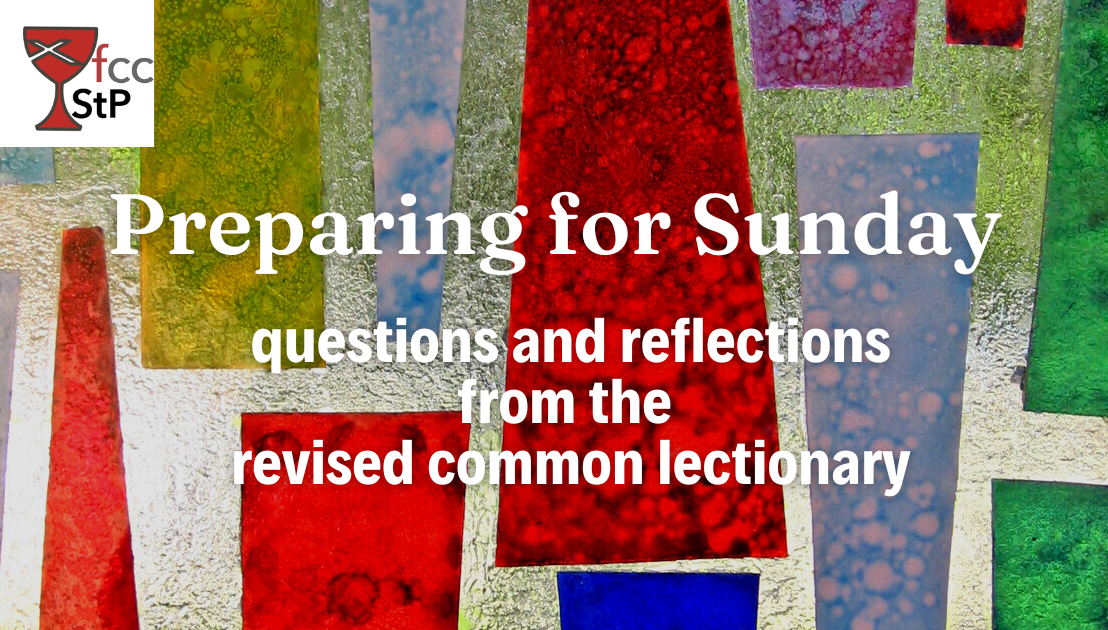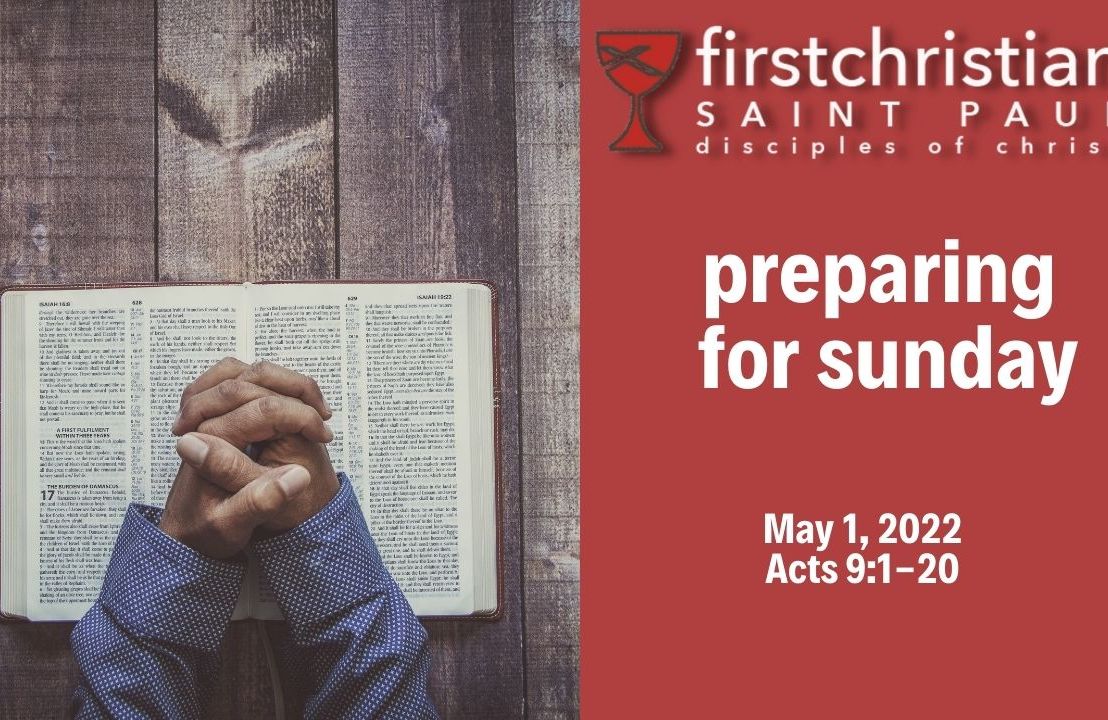Narrative Lectionary Reflection
April 29, 2018
Introduction
In college, I learned how to share Jesus with someone. There were several different methods including the Four Spiritual Laws, using the cross as a bridge representing Jesus as the bridge between humans and God and so on. This way of sharing your faith always seemed forced and not very real. It was never something that made you feel that you were just striking up a conversation.
A lot of people run away from the word evangelism. People have images of men and women that try to tell others about Jesus in ways that makes people want to run away and sour on the church.
Sometimes we aren’t afraid of evangelism as much was we are complacent. We take Jesus words of going into the world and have twisted them. Jesus and Paul called on the early church to get out and make disciples, but churches now want to bring people to church. Methodist pastor and theologian Allan Bevere shares what Paul did and then how we twisted the words around:
The strategy here should be obvious: establish communities in places with population, ease of travel, and resources, and then move out to the hinterlands to found new churches. If someone in today’s world were to do some kind of complicated sociological analysis of how to go about such a mission, the person doing the study would conclude that Paul’s strategy was indeed the best and most effective one available. In other words, the strategy is to preach and live the gospel for conversion, found new communities of faith, disciple those communities, and then send them out to preach and live the gospel in order to establish new churches. This strategy makes such perfect sense it is hard to quibble with it.
But that is exactly what many in the 21st century Western Church are doing– they are taking issue with Paul’s missionary strategy– not in words, but in their continued failure to have a missionary strategy at all. That lack of strategy is appropriately called “staying put.”
“Staying put” means trying to do something; hiring a young pastor, starting a new program, anything that gets people into the doors of the church. Instead of going out into our neighborhoods, we want to have people come to us.
But that wasn’t how Paul saw the sharing of the gospel. Paul is an extreme example, but he is an example that we aren’t called to sit in our church buildings, but we are called to go out and engage the culture.
In today’s text, Paul comes to Athens, the intellectual center of the Roman Empire. He takes in the sites and decides to engage the men seated in the center of town. Paul is an example of what it means to reach out not just way back then, but in the Mars Hills of our day.
Today we talk about Paul in Athens.
Engaging the Text
While Paul waited for them in Athens, he was deeply distressed to find that the city was flooded with idols.
-Acts 17:16
Paul is waiting in Athens for his travelling partners, Timothy and Silas. Since he has some time to kill, he decides to look around. Athens was one of the centers of Greek power. During Roman times, Athens might no longer be a seat of political power, but it is still an intellectual and religious capital in Greece and the wider Roman Empire. He walks through town that is littered with statues to idols. Paul’s Jewish background comes to the fore as he probably remembers the edict of having no other gods. His annoyance is no big shock. How he responds is worth noting. He connects with the local synagogue and also strikes up conversations in the marketplace in Athens. Some thought Paul was a “babbler,” but others find him interesting enough that they invited Paul to Mars Hill, a place that was away from the bustling crowds of the Athens marketplace. Always interested in the latest new idea, they wanted to know more about what Paul was talking about. Daniel B. Clendenin gives a good description of Mars Hill or Areopagus:
The “Areopagus” was both a place and a group. It’s a small rocky hill northwest of the Acropolis in Athens (Greek for “hill of Ares” or in Latin “Mars Hill”). More importantly, the Areopagus was the most prestigious and venerable council of elders in the history of Athens, so-named because it met on that site. Dating back to the 5th-6th centuries BCE, the Areopagus consisted of nine archons or chief magistrates who guided the city-state away from rule by a king to rule by an oligarchy that laid the foundations for Greece’s eventual democracy. Across the centuries the Areopagus changed, so that by Paul’s day it was a place where matters of the criminal courts, law, philosophy and politics were adjudicated.
Paul starts off noting how the thinkers around him were people that were interested in spiritual things. “People of Athens, I see that you are very religious in every way,” (Acts 17:22). He doesn’t start off attacking their idolatry, instead he praises their religiosity. He also notes that he saw the statue marked to an unknown God. This was probably not marked for God, Paul saw an opening to use to explain who God is. “What you worship as unknown, I now proclaim to you,” Paul says in verse 23.
Paul then goes about explaining the faith speaking in a way that the Stoics and Epicureans around him might understand. For example, he use the Stoic teaching of reason to see God as the source of logos or reason, a reason that created the cosmos and that implanted reason in each of us in order that we might connect with God. God didn’t just implant reason into us, but God is the source all, God created the world, meaning we are because if God or as Paul put it in 17:28, “In him we live and move and have our being.”
He wraps it up by calling on the men of Athens to repent. The time will come when we will be judge by a man appointed by God one raised from the dead. Some scoffed at the idea of a resurrection, but others were intrigued. The passage ends with two people who heard and believed. Paul then leaves Athens to head to Corinth.
Conclusion
Many of us sit in our churches and wonder, longing for the days when the pews were full. Churches are dealing with dwindling church attendance and longing for the days when the churches were full of people. We want to know what we can do to turn things around.
The thing is, we haven’t realized or we are only just now figuring it out, that the culture around us has changed. Fifty years ago, we were a culture where Christianity was synonymous with being an American. Sunday was truly a holy day in that nothing was open. People went to church because that was what you did.
Somewhere along the way, things changed. The culture is not as predominantly Christian as it once was. Not everyone knows the old Bible stories. People have other things to do on Sundays than going to church. And many churches are wondering what to do in this changing culture.
Sometimes we think we need to do something to bring people into the church like plant community gardens.
Andrew Forrest is the pastor of Munger Place Church, a Methodist Congregation in Dallas. He has said in an interview that “Every dying church in America has a community garden.” The meaning here is that churches tend to think that a certain strategy will get people into the pews instead of doing what Jesus called us to do: make disciples. Jesus in Acts 1:8 says that we are to go to the ends of the earth.
Paul engaged the people of Athens, by paying attention to the culture around him. He knew Athens was an intellectual and spiritual place and used it to tell the story of Jesus. What are the Mars Hills, and marketplaces in our cities and suburbs? What ways can we talk about Jesus that isn’t pushy, but acknowledges the context?
Paul didn’t for people to come to him, he went out to meet people. He tells the people of Athens that God created the world and everything in it, a God that claims us as God’s children.
Paul isn’t doing this in a chauvinistic way, instead, he uses points along the way to link it to his faith and persuade those gathered to consider another way- the way of Christ.
So, what would happen if we decided to actually engage the culture around us? What if we were willing to share about the God in whom we live and have our being in our places of work and in our social places? What if we went to where people are hurting- places where people are dealing with lack of food or housing and help them pursue those things in Christ’s name?
That is what Paul’s discussion on Mars Hill is all about. It’s about getting out of our pews and sharing Christ’s message with others by living our lives, by being Christ followers.
Dennis Sanders is the Pastor at First Christian Church of St. Paul in Mahtomedi, Minnesota. He’s written for various outlets including Christian Century and the Federalist.





 Acts 3:12-19 Common English Bible (CEB)
Acts 3:12-19 Common English Bible (CEB)